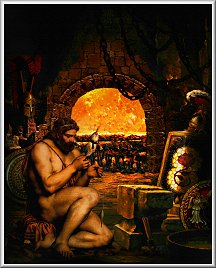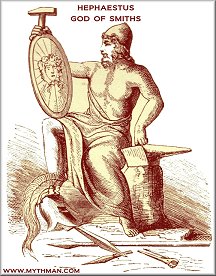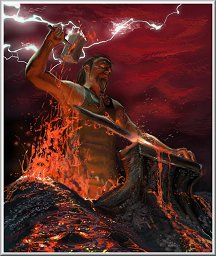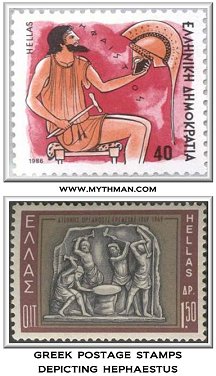
Hephaestus
CLICK
TO ENLARGE

Hephaestus
CLICK
TO ENLARGE

Hephaestus
CLICK TO ENLARGE

CLICK
TO ENLARGE
|
HEPHAESTUS PAGE TWO
(continued from Page One)
Once back among his fellow gods on Mount Olympus, Hephaestus
chose to live underground, where he could work as an artisan
undisturbed. He felt most at home there.
Hera grew to like her lame son, and felt very guilty for her
previous vile conduct towards him. She gave Hephaestus a massive
workshop with many bellows, anvils, and helpers; there he
continue to create beautiful ornaments, weapons, furniture and
jewelry to the endless amusement and delight of the Olympian
gods and goddesses.
To help him in his workshop, Hephestus forged handmaidens out of
gold, who were able to move around and help him in his work. You
could say that he was the first to create "robots".
In Homer's epic tale called the Iliad his wife is said
to be Aglaia (Splendor), one of the Graces; in the Odyssey she
is Aphrodite. But the commonly held belief is that Zeus, greatly
regretting his previous enmity towards this talented god, and
knowing that he could make great use of Hephaestus' skills,
gifted Aphrodite to Hephaestus as his wife.
Zeus felt that the beautiful goddess of love would arouse the
passions of the other Olympians, leading to great hostility and
bickering, and decided that the steady and easygoing god of the
forge would make a solid partner for her.
Aphrodite was not happy to be joined with such an unattractive
mate, but knew that it was a marriage only in name and did not
refuse. Her numerous extramarital affairs scandalized Olympus
and often made poor Hephaestus the butt of many jokes from his
fellow Olympians.
Hephaestus was a kind and peace-loving god, gentle and
introverted and popular both in heaven and on earth. Along with
Athena his patronage was very important to life in the city,
because they were the patrons of the handicrafts, which along
with agriculture were the lifeline and support of civilization.
Hephaestus protected the smiths and Athena the weavers, and the
people revered and paid homage to these important deities.
Physically, Hephaestus was generally represented as a sturdy and
muscular man with a thick neck and hairy chest who, because of a
shortened, lame leg and club foot, supported himself with the
aid of a crutch.
Bearded, this blue collar god most often was shown dressed in a
ragged sleeveless tunic and woolen hat. Most frequently, he was
portrayed in art holding the heavy tools of his trade,
especially the blacksmith's hammer and tongs.
Sometimes in artistic depictions, he was surrounded by the
Kabeiroi, the dwarflike blacksmith servants of the Mother
Goddess who helped in his subterranean forge, deep below
Olympus.
He was worshipped by all blacksmiths and artisans, who
recognized him as their special patron and venerated him
accordingly. Two great festivals, the Vulcanalia (celebrated by
the Romans on August 23, the first day of Virgo) and the
Hephaestia were celebrated in his honor.
His beautiful and detailed creations
included the following wonders:
 Aphrodite's golden girdle, which when worn made her completely
irresistible to both mortals and gods
Aphrodite's golden girdle, which when worn made her completely
irresistible to both mortals and gods
 The
silver bows and arrows of Artemis and Apollo The
silver bows and arrows of Artemis and Apollo
 His
robotic helpers, the handmaidens of gold His
robotic helpers, the handmaidens of gold
 The
twenty three-legged stools that ran to service the banquets of
the Olympians The
twenty three-legged stools that ran to service the banquets of
the Olympians
 The
palaces and homes of the Olympians, with their unbreakable
locks, as well as their twelve splendid thrones. The
palaces and homes of the Olympians, with their unbreakable
locks, as well as their twelve splendid thrones.
 The
famous Shield of Achilles The
famous Shield of Achilles
 Heracles' (Hercules') golden breastplate
Heracles' (Hercules') golden breastplate
 The
exquisite Necklace of Harmonia The
exquisite Necklace of Harmonia
 Athena's spear, Apollo's chariot and Demeter's sickle
Athena's spear, Apollo's chariot and Demeter's sickle
 The
awesome scepter of Zeus The
awesome scepter of Zeus
 The
golden bed of Helios, the sun god, which carries him as he
sleeps The
golden bed of Helios, the sun god, which carries him as he
sleeps
 The
armor of the gods in their war against the Titans The
armor of the gods in their war against the Titans
 Various
marvelous jewelry for Aphrodite and his Nereid surrogate mothers Various
marvelous jewelry for Aphrodite and his Nereid surrogate mothers
 The
Aegis, emblazoned with the head of Medusa, carried by both Zeus
and his daughter Athena The
Aegis, emblazoned with the head of Medusa, carried by both Zeus
and his daughter Athena
 The
invisible silver net that captured his cheating wife Aphrodite
and Ares in bed The
invisible silver net that captured his cheating wife Aphrodite
and Ares in bed

[home] [page one]
[page two]
|







